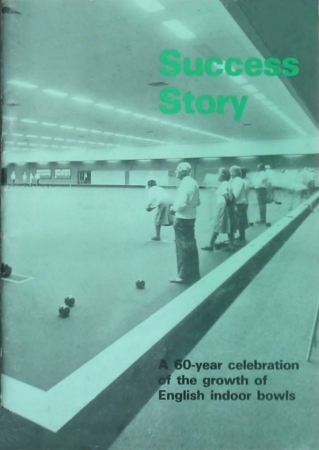| Title | Success Story | ||
| Authors | Donald Newby with David Rhys Jones | ||
| Publisher | Donald Newby on behalf of the English Indoor Bowling Association | ||
| First published | 1993 | ||
| ISBN | None | ||
| Edition reviewed | 1st | ||
| Hardback/softback | Softback | ||
| List price | Not known | ||
| Cover size (cm) (height x width) |
20.9 x 14.7 | ||
| Number of pages | 35 | ||
| Number of pages with | Coloured photos | Black & white photos | Line drawings |
| None | 11 | 2 | |
| Synopsis | This book - one of only six on this site that focus exclusively on indoor bowls - was produced to celebrate 60 years of English indoor bowls, from 1933 to 1993; it was in the former year that the English Bowling Association (EBA) formed an indoor section. The English Indoor Bowling Association itself came into being in 1972, replacing the EBA indoor section. At that time it had affiliations from 107 clubs; today (2008) there are over 330.
The history of the indoor game provides fascinating reading and the following paragraph is largely derived from the book's first chapter. Although covered bowling alleys existed in Tudor times, it wasn't until the end of the 19th century that the first endeavours to bring bowls indoors were attempted - albeit unsuccessfully: in 1888, in an Edinburgh drill hall, William Macrae tried to prove that bowling with wooden bowls covered with elastic bands was possible on a concrete surface covered in sawdust. In the early 1900s records exist of games being played in halls by gaslight, probably on coconut matting. Then the famous cricketing all-rounder Dr W G Grace, elected first President of the EBA in 1904, together with his brother, commandeered a gallery at the Crystal Palace in south-east London to allow indoor play by 36 members of the outdoor club; thus the Crystal Palace Indoor Bowling Club became the first indoor club to be established in England in 1905. The chapter headings are:
Also by Donald Newby: |
||



